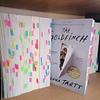Take a photo of a barcode or cover
Graphic: Animal death, Death, Gore, Misogyny, Violence, Blood, Grief, Medical trauma, War, Injury/Injury detail
Whilst a lot of the time the war sections didn't grab me nearly as much as those set in the domestic environment, there was still parts to appreciate. Pierre's journey particular is the highlight, as we following his examinations of life. Natasha is perhaps the biggest disappointment, often reading as manic and unrealistic, but her friendships with her family, and in particular Princess Marya in the latter parts of the novel, allow us to see her deep capacity for love.
Tolstoy's writing is so specific and invites you into his world with a twinkle in his eye. I'm so glad I read this. Thank you, Dave Malloy.
Graphic: Adult/minor relationship, Alcoholism, Death, Domestic abuse, Emotional abuse, Toxic relationship, Violence, Dementia, Grief, Death of parent, War, Classism
Moderate: Animal death, Confinement, Gun violence, Incest, Infidelity, Misogyny, Physical abuse, Suicide, Xenophobia, Blood, Kidnapping, Pandemic/Epidemic
Minor: Abortion, Pregnancy, Colonisation
Graphic: Death, Gore, Medical content, Grief, Fire/Fire injury, War, Injury/Injury detail
Moderate: Animal death, Child death, Dementia, Death of parent, Alcohol
Minor: Suicide attempt
I started enjoying it more when we got to the war parts (and while I did like the later peace parts more than the first one I kept enjoying the war parts more than those. Switching to an audiobook for the duller parts might also have played a role). I think that characters being less petty and frustrating played a large role in that. It did get better when the female characters started feeling less vapid and shallow than I felt they often came across in the earlier pages, something I picked up on after the first switch from more wary stuff back to a life of privilege. While there were still a lot of people to try keep track of the actual writing wasn't particularly difficult to read when I was actually interested in what was happening. I did find my interest slipping when things got less interesting to me though. I don't think it quite lives up to its reputation as the "best book ever" (I feel like it was a bit long at times) but I can see why some people love it so much. It was definitely an interesting insight into Russian culture and the attitudes of the time. Will I reread it? Probably no. But if you are interested in the time period and want to read this book, it does get better after the initial slog. Or at least it did for me.
Graphic: Death, Mental illness, Violence, Grief, War
Moderate: Animal cruelty, Animal death, Misogyny, Suicide attempt, Injury/Injury detail
Minor: Alcohol
Graphic: Adult/minor relationship, Animal cruelty, Animal death, Death, Emotional abuse, Terminal illness, Toxic relationship, Grief, Death of parent, War, Classism
Moderate: Infidelity, Mental illness, Misogyny, Sexism, Slavery, Fire/Fire injury, Abandonment, Injury/Injury detail
Minor: Racism, Dementia
Graphic: Alcoholism, Animal death, Child death, Death, Gun violence, Infidelity, Violence, Blood, Grief, Death of parent, Murder, Pregnancy, War, Injury/Injury detail



